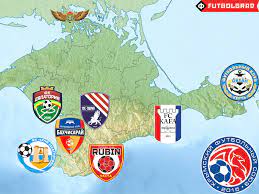By Andrew Brown
October 13 – Russia is proceeding with its incorporation of the Crimean Football Union (CFU) and its eight Premier League clubs into Russia’s national football league, an action prohibited by UEFA.
European football’s governing body banned Crimean clubs from taking part in competitions organised by the Russian Football Union (RFS) following Russia’s annexation of the region in 2014. A UEFA spokesperson told Insideworldfootball that its position remains unchanged.
But the management of the RFS and the CFU aren’t listening to UEFA.
On October 3, the Russian State Duma Committee on Physical Culture and Sports announced that integration of the eight clubs had begun. At an October 6 videoconference Sergey Borodkin, President of the CFU, told the Russian Football League (FNL) that the eight Premier League clubs are ready to join the FNL and meet its criteria.
Borodkin is also a member of the United Russia political party, and is Deputy of the State Council of the Republic of Crimea, which isn’t recognised by Ukraine. The State Council is headed by party colleague Vladimir Konstantinov, and both support Russia’s ‘special operation’ in – or invasion of – Ukraine.
An FNL Working Group was due to arrive in Crimea this week to assess the eight CFU clubs, however it has been delayed by the attack on the Kerch Bridge, which links Crimea to Russia. The CFU and its eight Premier League clubs failed to respond to repeated questions from InsideworldFfootball about whether they wished to become part of the Russian football league.
Publicly it appears that the eight clubs, all of which hold Russian internet domains, support the plans.
Since UEFA’s 2014 Decision, the CFU has been operating as a UEFA-designated ‘special zone’. Its clubs have no access to UEFA competitions, and no prospects for competition apart from against their seven rivals. In 2017, UEFA provided €1 million in funding to the CFU, perhaps in recognition of the stagnant situation.
“Today, football in Crimea simply exists and does not develop,” Valery Chaley, CEO of FC Sevastopol, told local media in September.
“Our best teams, in terms of infrastructure and quality of football, do not differ from those in the [Russian] Second Division. Only the RFS can help. Whoever plays, it’s all meaningless. Without professional competitions, there is no key development of youth sports and football in general. We play for no reason.”
“Our league is sometimes referred to by the players as “football in its own juice,”’ reads a September 9 statement from FC Kyzyltash. “Let’s talk about the risk of remaining in a game where it is familiar and safe to be. At the same level, with the same preparation, with the same degree of demands on oneself and with the same degree of motivation.”
Sergey Gardok, President of FC Yalta Rubin, told Sport Express that the arrival of the FNL working group is an “exceptionally positive” development. “In our case, we understand what points we need to work on, and are carrying out such work,” he continued.
As emphasised in its 2014 Statement, UEFA’s position is that club participation in any overseas league has to comply with its Statues. “A Member Association, or its affiliated leagues and clubs, may neither play nor organise matches outside its own territory without the permission of the relevant Member Associations,” reads Article 51.2.
UEFA refused to comment further when asked if this meant that the Ukrainian Football Association (UAF) would need to give approval for the integration of the eight CFU Premier League clubs into the Russian football league, given the ‘special status’ of the CFU. The Ukrainian Football Association (UAF) didn’t respond to questions about the situation.
For now, at least, it appears that Crimea’s eight Premier League football clubs remain in limbo.
Contact the writer of this story at moc.e1745452044vitai1745452044tiniy1745452044tirge1745452044tnist1745452044rops@1745452044nworB1745452044.ydnA1745452044 or moc.l1745452044labto1745452044ofdlr1745452044owedi1745452044sni@o1745452044fni1745452044

